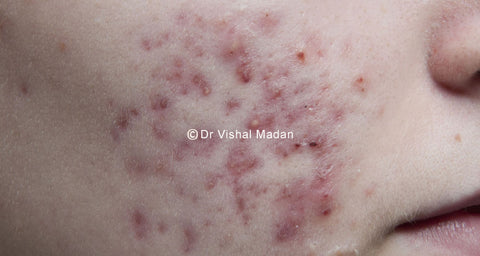Acne

Acne / Spots / Pimples / Zits most commonly affect teenagers but can be seen in any age group from infants to patients in their 60’s and 70’s. Typically acne suffers will experience oiliness of the skin around the face, upper parts of the chest and back. Spots can be painful, red or yellow with whiteheads and blackheads or a mix of all these features. Some patients may have combinations skin type, oily in the T zone and dry elsewhere.
What causes acne?
Hormonal, genetic, inflammation, bacteria all have been implicated in causing acne.
Many girls and women who suffer from acne, report a worsening of their acne around their menstrual period.Treatment must be tailored according to the type of acne.
Can it cause scarring?
In some cases, acne can be so severe that it can leave scarring. Some milder acne can also result in acne especially if it is picked upon. Scarring can be of many types.
What are the treatments?
The main aim of treatment is to prevent scarring. Early treatment is important to achieve this goal.
There are many treatments both prescription and over the counter for acne. Whilst over the counter treatments may be perfectly suitable for the mild acne, one may need to consider prescription treatments when the response to over the counter treatments may be inadequate.
The aim should be to identify the type of acne and use a treatment that is most likely to target the specific type of acne. Most treatments will target only a specific type of acne lesion but some will be ‘broad spectrum’ that is to say target all the lesions seen in acne.
Oral antibiotics, creams or gels, chemical peels, laser light all improve acne. In case of females, oral contraceptive pills or anti androgen treatments may be helpful.
Isotretinoin is one medication that has a very high success rate in the treatment of stubborn acne. This can be prescribed only by a fully trained dermatologist who understands the way the medication works and is able to monitor the treatment carefully.
There are many myths around acne and isotretinoin treatment. It is important to consult a fully qualified consultant dermatologist who can discuss the right treatment for the type and severity of acne. Treating acne early can prevent scarring, both physical and psychological.
Medical treatments are often combined with cosmeceutical products to achieve maximum benefit from available modalities of treatment.
Professor Madan has treated thousands of patients with acne over the years with excellent outcomes. Treatments can be truly transformational not only improving the acne but also having a profound positive impact on patient’s psychological well-being. Most importantly identifying patients requiring intensive treatment to prevent scarring should be the goal of treatment.

